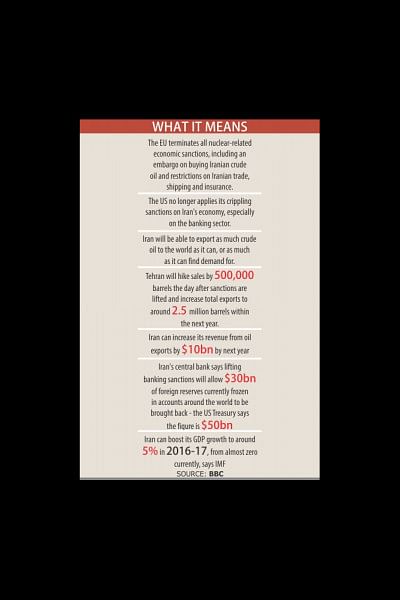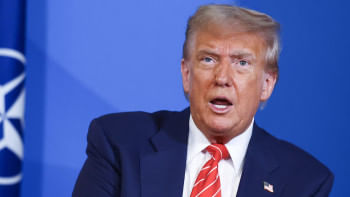Int'l sanctions on Iran lifted

Iran has reentered the global economy as years of crippling international sanctions ended in exchange for the verified disabling of much of its nuclear infrastructure.
For Iran, implementation of the landmark deal it finalised with six world powers last summer means immediate access to more than $50 billion in long-frozen assets and freedom to sell its oil and purchase goods in the international marketplace.
Tehran has hailed the deal as vindication of its power and influence in the world.
“Today marks the start of a safer world,” said Secretary of State John F Kerry. “We understand this marker alone will not wipe away all the concerns the world has rightly expressed about Iran's policies in the region. But we also know there isn't a challenge in the entire region that wouldn't become much more complicated, much worse, if Iran had a nuclear weapon.”
The removal of sanctions comes as President Obama begins his last year in office, and almost seven years to the day since he called on Iran to “unclench your fist” and take steps toward rapprochement with the United States and the world. As a result of the agreement, he said Tuesday in his final State of the Union speech, a “nuclear-armed Iran” has been prevented, and “the world has avoided another war.”
Iranian President Hassan Rouhani said yesterday that a nuclear deal with world powers was a "golden page" in the country's history, a day after sanctions against the Islamic republic were lifted in return for Tehran complying with a deal to curb its nuclear ambitions.
Addressing parliament and presenting the draft budget for the next Iranian fiscal year, Rouhani said the deal was a "turning point" for the country's economy.
Rouhani said the deal “opened new windows of engagement with the world” and the country should “get ready to seize the opportunity to make an economic leap and development”, while speaking in Parliament yesterday.
Hours after sanctions imposed by US, UN and EU on Tehran were lifted - thereby removing an obstacle to exports - the deputy oil minister announced Iran was ready to increase its crude oil exports by 500,000 barrels a day.
Rouhani said Iran should use the expected influx of money and investments following the end of sanctions to spark the "economic mutation" of the country, creating jobs and enhancing quality-of-life for Iranian citizens, after the country has suffered double-digit inflation and high unemployment rates for years.
| Overview Int'l sanctions against Iran UNITED NATIONS March 2007 March 2008 June 2010 UNITED STATES June 1995 Nov 2008 July 2010 Nov 2011 Dec 2011 July 2012 EUROPEAN UNION Jan 2012 Oct 2012 Dec 2012 Source: AFP |
PRISONER SWAP
Three Iranian-Americans left Tehran yesterday under a prisoner swap following the lifting of sanctions on Iran.
A US official said a Swiss plane had left carrying Jason Rezaian, the Washington Post's Tehran bureau chief, Saeed Abedini, a pastor from Idaho and Amir Hekmati, a former Marine from Flint, Michigan, as well as some family members.
One more Iranian-American released under the same swap, Nosratollah Khosravi-Roodsari, was not aboard the aircraft. A fifth prisoner, American student Matthew Trevithick, was released separately on Saturday, a US official said.
"We can confirm that our detained US citizens have been released and that those who wished to depart Iran have left," a senior US administration official said.
Several Iranian-Americans held in US prisons after being charged or convicted for sanctions violations have also been released, their lawyers told Reuters yesterday.
The prisoner deal was the culmination of months of diplomatic contacts, secret talks and legal manoeuvring which came close to falling apart because of a threat by Washington in December to impose fresh sanctions on Iran for recent ballistic missile tests.
US President Barack Obama yesterday hailed the release of five Americans who had been held in Iran, even as three of them were on their way to Switzerland.
"When Americans are freed, that's something we can all celebrate," he said in a televised statement from the White House.
BALLISTIC MISSILE SANCTION
Just a day after the sanctions were lifted, the United States on Sunday announced new sanctions linked to Iran's ballistic missile programme.
In remarks shortly before the US announcement, Iran's President Hassan Rouhani of Iran said that any new American sanctions would be "met by an appropriate response."
The US Treasury Department said in a statement that it had added five Iranian nationals and a network of companies based in the United Arab Emirates and China to an American blacklist.
It said the network had "obfuscated the end user of sensitive goods for missile proliferation by using front companies in third countries to deceive foreign suppliers" and that the five individuals had "worked to procure ballistic missile components for Iran."
Adam J Szubin, acting under secretary for terrorism and financial intelligence, said that "Iran's ballistic missile programme poses a significant threat to regional and global security, and it will continue to be subject to international sanctions."
Rouhani, speaking at a news conference in Tehran some 90 minutes before the new US measures were announced, was asked what would happen if the United States imposed new sanctions or violated terms of the nuclear agreement.
"Any action will be met by a reaction," he said.
"If the Americans impose any measure they will receive an appropriate response."
Source: Washington Post, The Independent, Reuters, AFP

 For all latest news, follow The Daily Star's Google News channel.
For all latest news, follow The Daily Star's Google News channel. 



Comments